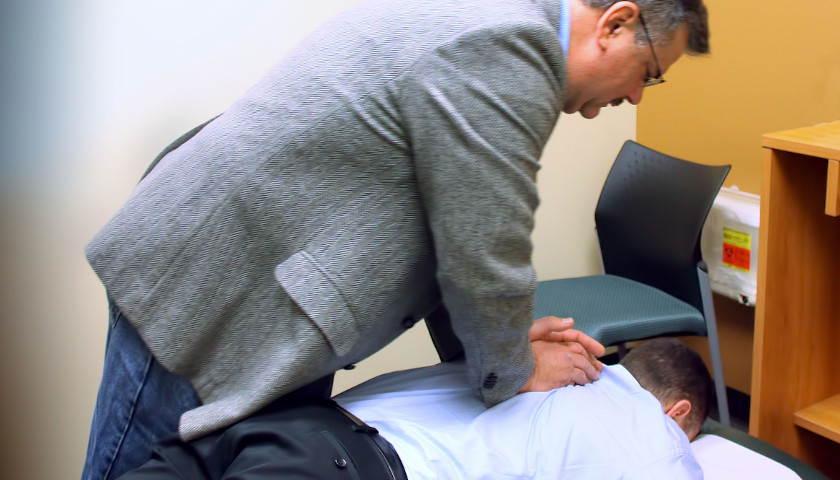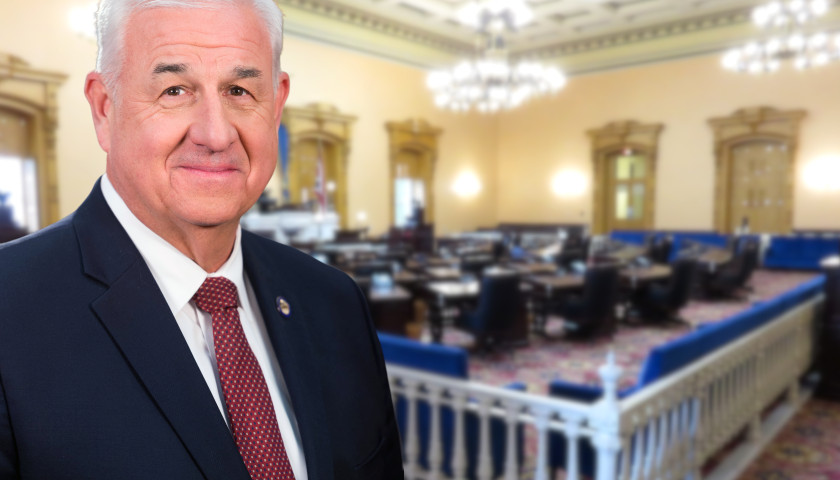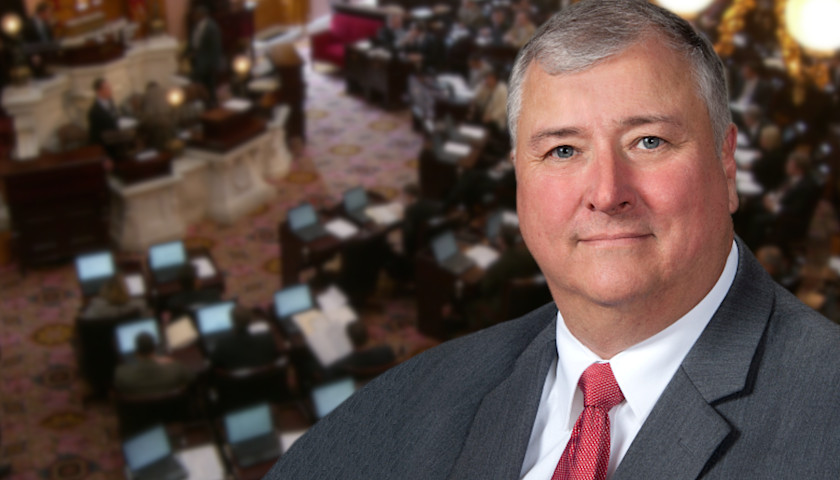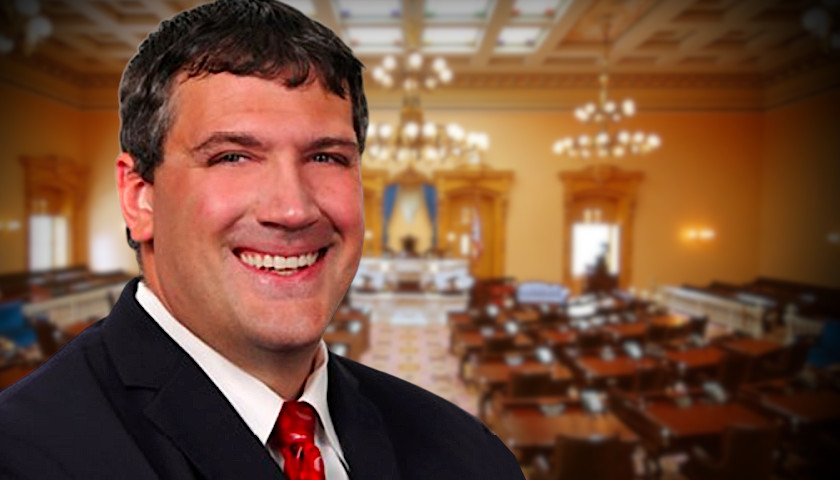The Buckeye Institute submitted written testimony Wednesday to the Ohio Senate Judiciary Committee on the policies of Senate Bill 308, which would provide businesses and workers with immunity from COVID-19 related lawsuits.
Read the full storyTag: Ohio House
State Rep. Grendell Drafts Bill to Force More Data Transparency from Dr. Amy Acton on COVID-19
State Rep. Diane Grendell (R- Geauga County) wants Ohio Health Department Director Dr. Amy Acton to be more forthcoming about COVID-19 statistics.
Grendell drafted the “Truth in COVID-19 Statistics” bill, the Record-Courier reported. She said the bill will be introduced in the House later this week, and she expects it to gain bipartisan support.
Read the full storyHouse Democrat Criticizes Ohio Economic Recovery Task Force for Focusing Solely on Reopening
A top Democrat on the Ohio House’s coronavirus economic recovery task force criticized its Republican chair for gathering “one-sided testimony that only supported the idea of opening Ohio as soon as possible.”
In a statement released last week, Rep. Terrence Upchurch (D-Cleveland), vice chair of the Ohio 2020 Economic Recovery Task Force, voiced frustration with the fact that the committee hasn’t heard from “minorities or women.”
“We were under the impression by the majority that this task-force would be a bipartisan, collaborative effort to map out next steps for the General Assembly’s response to the COVID-19 crisis in Ohio,” he said. “However, it became almost immediately apparent from the agenda and the chosen speakers that this task force was actually designed to gather one-sided testimony that only supported the idea of opening Ohio as soon as possible. This was never a democratic process.”
Read the full storyOhio Dems Call Attorney General ‘Opportunistic’ and ‘Despicable’ for Telling Abortion Clinics to Close
Ohio Democrats called Attorney General Dave Yost “opportunistic” for urging abortion clinics to close during the coronavirus pandemic.
Gov. Mike DeWine and the Ohio Department of Health issued an executive order Tuesday that required health providers to cancel all non-essential or elective surgeries that utilize personal protective equipment (PPE).
Read the full storyOhio Democrats Use Coronavirus to Advocate for Paid Family and Medical Leave
Ohio House Democrats are using the coronavirus outbreak in the United States to advocate for paid family and medical leave.
Read the full storyBipartisanship in the Ohio House
In this age of hyper-partisanship, there is still bipartisan agreement in the Ohio House.
Read the full storyOhio House Passes Bill to Attract More Chiropractors
The state House has signed off on a bill that would repay outstanding chiropractic school debt for doctors who agree to serve in areas where there is a shortage of chiropractors.
Read the full storyDark Money Group Promoting DeWine’s Gun Control Platform Has Connections to Governor
A recent report found that a dark money group promoting Gov. Mike DeWine’s gun control platform has connections to the governor himself.
Read the full storyOhio House Committee Considers Anti-Sanctuary Cities Act
An anti-sanctuary bill is pending in the Ohio House of Representatives.
Read the full storyOhio House Bill Would Kill American Government and History Testing
The Ohio House is currently considering a bill that would reduce the number of state-mandated standardized tests students are required to take by eliminating four end-of-course exams, including the American history and American government exams. House Bill 239, referred to as the Testing Reduction Act, was introduced by Reps. Gayle Manning (R-North Ridgeville) and Erica Crawley (D-Columbus), and is scheduled to receive its third hearing Tuesday in the House Primary and Secondary Education Committee. “During my 37 years in an elementary school classroom, I experienced first-hand how stressful standardized testing can be for students. In order to prepare students for the standardized test, teachers often give local diagnostic assessments. I believe so much weight is placed on a score of a standardized test, and creativity in the classroom is dwindling. Every student is different and not every student will excel on a standardized test,” Manning said when testifying on the bill. In 2012, the Ohio Legislature passed into law Senate Bill 165, which required schools to teach America’s founding documents, like the U.S. Constitution, the Declaration of Independence, and the Bill of Rights. In her testimony, Manning maintained that these documents will still be taught even if the American…
Read the full storyState Senator Says Cutting Tax Breaks for Small Businesses Would Be ‘a Mistake’ for Ohio
State Sen. Lou Terhar (R-Cincinnati) said it would be “a mistake” for the Ohio Senate to support a decrease to the tax breaks small businesses receive in the state. “There are a range of issues with the House budget that concern us in the Senate. The first would be the cut of the small business tax, which we believe is a mistake,” Terhar said. “Once we take a position on how small businesses should be treated, we should stick with that position,” he added. Terhar said that if “you’re going to encourage small businesses” by giving them a tax cut “and then take that away,” it will make business owners wonder if they “really want to invest in Ohio.” Under the House’s version of the budget bill, Ohio’s Business Investment Income Deduction would be lowered to $100,000. As of now, small businesses don’t pay taxes on the first $250,000 of income, but that figure would drop down to $100,000 under House Bill 166. Terhar’s comments came during a recent forum on the state budget hosted by Ohio’s Future Foundation and its chairman, former Congressman Jim Renacci. “One of the concerns is we still do not have a state that’s…
Read the full storyAnti-Smoking Groups Actually Testified Against Ohio Gov. DeWine’s Proposal to Raise Minimum Age to 21
Ohio Gov. Mike DeWine has called for raising the minimum age to purchase tobacco from 18 to 21, a proposal that’s included in Ohio’s biennial budget bill. But anti-smoking groups in the state have actually testified against the proposal. These groups believe that the proposal would mostly punish youth for underage sales but would do little to punish retailers for illegal sales. “Those of us who work on this issue every day in venues around the country recognize this bill as unacceptable by today’s standards,” said Wendy Hyde of the Preventing Tobacco Addiction Foundation. “Simply changing ‘18’ to ‘21’ without changing the structure of licensure and enforcement would be meaningless.” During a May 5 testimony on House Bill 166, Hyde said that “penalties for illegal sales to persons under age 21 should be placed on the retail owner who makes a profit from illegally selling harmful and deadly products rather than on the clerk or the youth.” “Penalties for repeated violations must result in meaningful fines and be followed up with license suspension for those few retailers who refuse to comply. Penalizing youth is not an an effective strategy for reducing youth smoking,” she said. She went on to…
Read the full storyOhio House Democrats Unveil Package of Gun-Control Laws
Ohio House Democrats announced their plans Wednesday to introduce a package of gun-control laws in response to the so-called constitutional carry bill making its way through the committee process. As The Ohio Star previously reported, Republicans introduced a bill in March to bring constitutional carry to the Buckeye state, which would allow gun owners to carry concealed weapons without obtaining a permit. “Gun owners are law abiding citizens who follow the rules, and we need to let them be able to protect themselves,” Rep. Tom Brinkman (R-Mt. Lookout), a cosponsor of the bill, said at the time. Democrats called the bill a “solution in search of a problem,” and revealed their plans to introduce a number of equally controversial gun-control laws. “The answer to gun violence is not simply more guns. The answer is responsible gun ownership with laws that protect the gun owner and non-gun owner alike,” Rep. Adam Miller (D-Columbus) said in a press release. “If HB 178 passes it will be easier to own a concealed weapon than it is to register to vote. Our children and our law enforcement community deserve better.” The package of bills includes the Child Safety Protection Act, which would require…
Read the full storyDeWine Opens Up Investigation, Calls for Lifting Statute of Limitations in Response to ‘Monster’ Richard Strauss
Gov. Mike DeWine called for lifting the statute of limitations in cases of rape and sexual abuse in response to the report surrounding former Ohio State University team doctor Richard Strauss. According to a report released Friday by the university, Strauss, who killed himself in 2005, abused at least 177 male students over his two-decade career at the state’s flagship university, where he worked from 1978 to 1998. The report describes Strauss’ sexual abuse as an “open secret” among coaches, trainers, and other doctors, The Ohio Star reported last week. DeWine was particularly concerned about what the State Medical Board of Ohio knew, when they knew it, and what they did about it. “The question that we are faced with is this: did the State Medical Board of Ohio take appropriate action regarding Richard Strauss? What did they know? When did they know that? What did they do about it?” DeWine said during a Monday press conference. “We should all be disgusted. Every Ohioan should be disgusted and should be angered by what has happened. Not only by the horrific and vile acts perpetrated by Richard Strauss, but also they should be angered that complaints and reports about this…
Read the full storyConservative-Backed Ohio House Bill Would Clear Hurdles for Military Spouses Seeking Employment
A bill making its way through the Ohio House would make it easier for military spouses living in the state to obtain professional licenses, a policy championed by the conservative Buckeye Institute. House Bill 133, sponsored by Rep. Rick Perales (R-Beavercreek), would grant full professional licenses to military spouses who hold a license from a different state, so long as the requirements of the other state are similar to or stricter than the requirements in Ohio. If the out-of-state license doesn’t meet Ohio’s standards, then spouses would qualify for a temporary license in Ohio. While testifying Wednesday in support of the bill, The Buckeye Institute research fellow Greg Lawson told the story of Brianna McKinnon, who was a certified teacher living in Washington state before her husband was stationed at Wright-Patterson Air Force Base. “When Brianna and her husband got settled in Ohio, she learned that the state makes it very difficult for military spouses to get an Ohio job license so they can quickly begin working in their chosen professions,” Lawson said. “To get an Ohio teaching certificate Brianna would have to take numerous college courses, take a number of exams and she would have had to pay…
Read the full storyOhio House Dems and Republicans Continue Unusual Bipartisan Push
Ohio House Democrats and Republicans unveiled a set of bills Monday at a joint press conference, continuing an unusual bipartisan push in the Ohio Legislature after successfully passing a state budget bill. “By working together, we can strengthen Ohio families, give our children a brighter future and create a strong foundation for economic growth,” said House Minority Leader Emilia Strong Sykes (D-Akron) during Monday’s press conference. Two of the bills unveiled Monday focus on strengthening the state’s foster care system. House Bill 8, sponsored by a Democrat and a Republican, seeks to improve foster caregiver training so foster parents can be trained more effectively. House Bill 14 would establish the Kinship Navigator Program, a new program that would help caregivers locate support services that are available to them. “The state’s done a lot to help those struggling with addiction. What we’re trying to do is make sure we’re also helping others who have been impacted by the addiction crisis,” House Speaker Larry Householder (R-Glenford) said. Ohio’s foster care system is “being stretched to the limit” as a result of the opioid epidemic. In Ohio alone, the number of kids in foster care has surpassed 15,000 and increased by 25…
Read the full storyOhio House Passes Tax Increases on Small Businesses During Small Business Week
The Ohio House passed House Bill 166 Thursday, its version of the state’s biennial budget. While the bill includes substantial income tax reductions, some groups aren’t pleased with the impact it will have on small businesses. Under the bill, Ohio’s Business Investment Income Deduction would be lowered to $100,000. As of now, small businesses don’t pay taxes on the first $250,000 of income, but that would be lowered to $100,000 under House Bill 166, which passed Thursday in a 85-9 vote. Eight Republicans and one Democrat voted against the budget proposal. “We had some really good debates and good ideas, and I think this budget will make a difference for Ohioans,” House Speaker Larry Householder (R-Glenford) said in a press release. “Some of the ideas we talked about are going to become separate bills in order to build them out a bit more. We’re just getting started.” The Ohio Chamber of Commerce was disappointed the bill passed, saying it “includes a $1.1 billion tax hike on small business owners, reducing their ability to reinvest in their businesses.” The bill “means less money for worker training, increased wages, new technology or equipment, or expanded operations,” the Ohio Chamber said. “Tax…
Read the full storyConservatives Warn Ohio Lawmakers to Take Steps to Avoid ‘Disastrous Recession’ During Budget Talks
The Buckeye Institute, an Ohio-based conservative think tank, warned lawmakers Tuesday that state government spending “has outpaced inflation and population growth for years,” meaning the “day of reckoning will be painful for families and businesses” if they don’t cut down on spending. Greg Lawson, a research fellow at The Buckeye Institute, testified before the Ohio House Finance Committee on House Bill 166, the House version of the state’s biennial budget. Lawson began his testimony by noting that the budget decisions arrive “during an economic expansion of historic duration.” In fact, if current economic growth continues until July, it will be “the longest economic expansion in U.S. history.” “Now is the time to pursue meaningful, sustainable reform and take full advantage of this biennial opportunity to make Ohio more prosperous, while avoiding missteps that could lead to a disastrous recession,” Lawson said, suggesting changes to the proposed budget in the areas of government spending, public education, Medicaid, and taxes. He argued that “spending ever-greater sums of taxpayer dollars every fiscal year establishes higher budget baselines that make economic downturns more painful and policy choices more difficult.” “Setting those higher baselines forces future policymakers to choose between painfully increasing taxes during…
Read the full storyOhio’s Revised Budget Proposal Makes Tax Code ‘Fairer’ But Punishes Small Businesses Retroactively, Conservatives Say
A revised state budget proposal unveiled Thursday by House Republican leadership would introduce substantial income tax cuts for Ohioans but would do so by eliminating tax breaks for small businesses. The budget plan, House Bill 166, builds off of the budget proposal put forward by Gov. Mike DeWine, who said Friday that the bill sticks to the “essential principles” of his proposal. Under the proposal, Ohio’s lowest tax brackets would be completely eliminated, such that earners who make $22,250 or less annually wouldn’t pay any state income taxes. The state’s middle two brackets would also see significant reductions in income taxes. But these income tax reductions would be partially paid for by cutting down on the state’s small business tax deduction. Currently, small businesses don’t pay taxes on the first $250,000 of income, but that would be lowered to $100,000 under the new budget proposal. “We shouldn’t try to pick winners and losers. What we should try to do is set a balanced field out there and let people compete in business,” House Speaker Larry Householder (R-Glenford) said when unveiling the proposal. The Buckeye Institute, an Ohio-based conservative think tank, believes that Republicans are making a mistake in not…
Read the full storyOhio State Rep Introduces Bill in Response to 9-Year-Old’s Drag Performance
State Rep. Tim Schaffer (R-Lancaster) has introduced a bill that he says would close a “loophole in child exploitation laws” after a 9-year-old boy performed in drag at a bar just outside of Columbus. Jacob Measley, who performs under the name “Miss Mae Hem,” sparked outrage online in December after photos of him surfaced performing at JD Hendersons bar in Schaffer’s district. Under House Bill 180, the definition of “endangering children” would be expanded to include a “performance that suggests a minor is participating or engaging in sexual activity” that, “taken as a whole by the average person applying contemporary community standards, appeals to prurient interest.” The bill also states that no Ohioan shall “entice, coerce, permit, encourage, compel, hire, employ, use, or allow the child to act, model, or in any other way participate in, or be photographed for, the production, presentation, dissemination, or advertisement of any material or performance that the offender knows or reasonably should know is obscene, is sexually oriented matter, or is nudity-oriented matter.” “Given our heightened focus on human trafficking and the role money plays in trafficking children, I knew I had to take action to make sure this activity does not occur again,”…
Read the full storyOhio Lawmakers Look to Come Together on Tax Reform Amid Divisive Abortion Battle
Ohio House Democrats unveiled a number of proposals Thursday that they claim will “modernize” Ohio’s tax system to “benefit working people, families and small businesses.” They’re calling the set of proposals the “People First Tax Reform,” which will include a “Working Families First” tax incentive. This incentive would reform Ohio’s Earned Income Tax Credit by removing caps and making the credit refundable, according to a press release from the minority caucus. House Democrats claim this incentive could save families up to $212 million each year, and note that similar ideas were included in the biennial transportation budget. “We saw some pieces of the Working Families tax incentive in the transportation budget, so we know there is a bipartisan appetite for these commonsense reforms,” House Minority Leader Emilia Strong Sykes (D-Akron) said. “We need to work together to get our state on the right track so we can start growing again.” Another proposal calls for fixing the “state’s LLC loophole,” which Democrats describe as a “tax giveaway to Ohio businesses that, when designed, was supposed to create jobs.” Ohio’s job creation has consistently lagged behind the national average in recent years. “Years of tax giveaways and loopholes have held our state…
Read the full storyHeartbeat Bill Set to Become Law in Ohio After Emotional Day at the Statehouse
One of the most divisive and talked-about bills in Ohio’s history is officially on its way to Gov. Mike DeWine’s desk and is expected to be signed into law at any moment. After months of debate and numerous committee hearings, the heartbeat bill passed the Ohio House Wednesday afternoon in a 56-40 vote along party lines. It then went back to the Senate where changes made to the bill in the House were approved in an 18-13 vote. According to Cleveland-based reporter Laura Hancock, four Republicans voted against the bill in the Senate, since it doesn’t include exceptions for rape or incest. Here is the roll call in the #senate Which quickly voted to go with changes made in the Ohio house to #heartbeat #abortion bill. pic.twitter.com/PscVpnLE9P — Laura Hancock (@laurahancock) April 10, 2019 The House Health Committee was still hearing witness testimony on the bill as early as Tuesday, when several pro-choice religious organizations testified against it, as The Ohio Star reported. Protesters and activists from both sides of the debate gathered in the House chambers during Wednesday’s vote. While representatives were casting their votes, pro-abortion activists held a banner over the upper railings of the chambers, which read:…
Read the full storyOhio Lawmakers Look to Institute $10,000 Fines for Violations of Heartbeat Bill, Use Money Collected for Adoption Efforts
Ohio House Republicans added substantial new provisions to their version of the “heartbeat bill” that have the potential to make one of the state’s most controversial pieces of legislation even more divisive. While the Senate already passed its version of the bill last month, it is still making its way through the committee process in the House. During its third hearing for the bill Tuesday, the Ohio House Health Committee adopted several changes to the text of the bill. One of those changes would allow the Ohio State Medical Board to fine up to $10,000 for “each separate violation or failure of a person to comply” with the provisions of the bill. Money collected through these fines would then be deposited into a new “Foster Care and Adoption Initiatives Fund,” which would be established upon the bill’s passage. Another change would require the Ohio Director of Health to adopt rules “specifying the appropriate methods of performing an examination for the purpose of determining the presence of a fetal heartbeat of an unborn human individual.” Along those lines, the new changes prevent the exclusion of transvaginal ultrasounds “as a method of detection.” Transvaginal ultrasounds, as opposed to abdominal ultrasounds, can detect…
Read the full storyCommunities Brace for Diesel Tax Increases After Ohio Gov. DeWine Signs Gas Tax Into Law
In one of his first major acts in office, Gov. Mike DeWine (R-OH) signed into law the state’s first gas tax increase since 2005. The issue has been the focal point of his first few months in office, and negotiations with House and Senate Republicans have not been easy. But on Tuesday, all parties finally agreed to a compromise: 10.5 cents on regular fuel, and 19 cents on diesel. That will bring the total gas tax to 38.5 cents, and the total diesel tax to 47 cents, both of which are currently taxed at an equal rate of 28 cents. The increase, set to go into effect July 1, doesn’t seem to have the support of most Ohioans, especially those who rely on diesel fuel. “Diesel fuel powers our economy, because it’s what the trucks that deliver Ohio-made products to market run on. A 19 cent increase on diesel will move Ohio well past the state average of 30.2 cents of tax per gallon and leave us with the sixth highest tax rate on diesel fuel in the country. This does not make Ohio more competitive and will be damaging to Ohio’s economy and to our businesses,” the Ohio Chamber…
Read the full storyLake Erie Improvements Bill Turned Into a 90-Page Spending Package with $2 Million in Renovations to the Ohio Governor’s Residence
The Ohio Governor’s Residence in Bexley is set to receive $2 million in renovations on the taxpayer’s dime after the funding was tossed into a catch-all bill passed at the last minute of 2018. Senate Bill 51 was initially introduced in the Ohio Senate in February 2017 as a piece of legislation focused on facilitating “Lake Erie shoreline improvements.” It didn’t pass the Senate until July 2018, and wasn’t taken up by the House until December. As it was introduced, the bill was only 14 pages long and was intended to amend two sections of Ohio Revised Code and “authorize the creation of a special improvement district to facilitate Lake Erie shoreline improvement.” By the time it was passed, the bill was 90 pages long, amended eight sections of Ohio Revised Code, offered amendments to 16 different sections of two House bills, and had a final description of: “Authorize the creation of a special improvement district to facilitate Lake Erie shoreline improvement, to revise other laws governing taxation and public property and otherwise provide authorization and conditions for the operation of state programs, and to make appropriations.” Of those appropriations was a $107 million “administrative building fund” under the Department…
Read the full story























